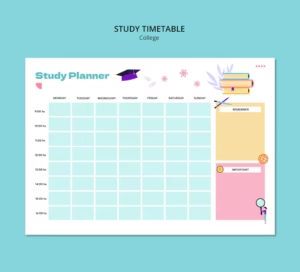8 Strategies for Improving Performance in Competitive Exams
Understanding the Importance of Performance in Competitive Exams
 Competitive examinations, such as the GRE, SAT, and UPSC, serve as crucial benchmarks for both academic and professional opportunities. These tests are designed not just to evaluate a candidate’s knowledge but also to assess their ability to perform under pressure. The significance of strong performance in these assessments cannot be overstated, as a high score can open doors to prestigious universities and desirable job placements. Conversely, a mediocre performance may limit future prospects, creating substantial pressure for candidates.
Competitive examinations, such as the GRE, SAT, and UPSC, serve as crucial benchmarks for both academic and professional opportunities. These tests are designed not just to evaluate a candidate’s knowledge but also to assess their ability to perform under pressure. The significance of strong performance in these assessments cannot be overstated, as a high score can open doors to prestigious universities and desirable job placements. Conversely, a mediocre performance may limit future prospects, creating substantial pressure for candidates.
The stakes involved in these exams are notably high. For instance, statistics indicate that only about 50% of students gain admission to their first-choice institution based on standardized test scores. In competitive fields, such as medicine or business, many employers explicitly consider exam results as part of their recruitment process. This often leads candidates to prepare rigorously, as they understand that the implications of their performance extend far beyond the exam room.
Additionally, the emotional and psychological pressure candidates face cannot be ignored. Many individuals experience anxiety that affects their test-taking abilities; studies show that anxiety goes hand in hand with exam performance. Anecdotal evidence from students emphasizes that mastering effective exam techniques is vital. Those who adopt strategies such as timed practice tests and mindfulness exercises report considerable improvements in their scores.
Therefore, it is clear that excelling in competitive exams is not merely about academic proficiency; it encompasses a comprehensive approach that includes understanding the format of the exams, practicing effectively, and managing stress. By focusing on these multidimensional strategies, candidates can better position themselves for success in both their examinations and future endeavors.
Setting Clear Goals and a Study Schedule
Preparing for competitive exams requires a structured approach to maximize efficiency and effectiveness. One fundamental aspect of this approach is the establishment of clear goals, often encapsulated in the SMART criteria—specific, measurable, achievable, relevant, and time-bound. By beginning with well-defined objectives, individuals can create a focused pathway for their studies, making it easier to allocate time and resources effectively.

Specific goals help to delineate what needs to be accomplished, thereby minimizing confusion and enhancing motivation. For example, setting a goal to achieve a certain score in a particular subject provides clarity and direction. To ensure that these goals are measurable, incorporating metrics such as the number of chapters completed or hours studied can be beneficial. Achievable goals consider personal circumstances and capabilities, which fosters a sense of accomplishment without fostering frustration.
Once clear goals are established, crafting a study schedule becomes imperative. An effective schedule allocates appropriate time for each subject, prioritizing areas that require more focus while incorporating periods for practice tests and revision. Utilizing an exponential approach to build knowledge and skills can also make studying more manageable. For instance, breaking down material into smaller topics can prevent overwhelm and lead to gradual, consistent progress.
Time management plays a pivotal role in exam preparation. Techniques such as the Pomodoro Technique, which uses structured intervals of focused study followed by short breaks, can significantly enhance concentration and retention. Additionally, prioritization of tasks based on urgency and importance ensures that the most critical subjects or topics receive adequate attention, ultimately improving overall performance in competitive exams.
Building Foundations: Mastering the Fundamentals
In preparation for competitive exams, mastering the fundamentals of key subjects is essential. A solid grasp of these core concepts not only enhances understanding but also builds confidence when approaching more complex topics. The first step towards achieving this mastery involves a thorough review of the exam syllabus. Understanding what areas are prioritized can guide your study efforts and ensure you are focusing on the most relevant concepts.
Utilizing textbooks is an effective strategy for reinforcing foundational knowledge. These resources often provide comprehensive coverage of essential topics and organized explanations. As you engage with textbooks, take diligent notes and highlight crucial sections to facilitate easier revision later on. Breaking down chapters into manageable parts, and setting specific learning goals for each session, can create a structured approach to learning. Additionally, online resources such as educational platforms and academic websites can supplement traditional textbooks, offering multimedia explanations and interactive exercises that cater to various learning styles.
Tutorials, whether in-person or virtual, further enhance understanding of fundamental concepts. They provide opportunities for personalized instruction and clarifications on difficult topics. Engaging in group studies can also be beneficial, as discussing topics with peers allows for different perspectives and collaborative problem-solving. This exchange of ideas may reveal gaps in knowledge and inspire renewed motivation to delve deeper into specific subjects.
As you work on solidifying your foundations, it is important to implement regular assessments of your knowledge. Practice exams and quizzes can help identify areas requiring further attention. By continually reviewing and reinforcing your knowledge base in core subjects, you are setting yourself up for a more comprehensive understanding—one that is critical for success in any competitive exam.
Practicing with Mock Tests and Past Papers
Engaging in regular practice using mock tests and past exam papers can significantly enhance a candidate’s performance in competitive exams. These resources serve as simulated environments that replicate the actual test experience, allowing individuals to become accustomed to the format and time constraints they will encounter. By regularly practicing under these conditions, candidates can

alleviate exam-day anxiety, leading to improved focus and composure.
Mock tests are designed to mirror the structure and complexity of real exams. Consequently, they provide valuable insights into the types of questions that may be presented and the depth of understanding required to answer them effectively. Practicing with these tests enables candidates to identify their strengths and weaknesses in various subject areas. For instance, if a test-taker consistently struggles with specific topics, they can tailor their study plans to allocate more time and resources to those areas, honing their knowledge and skill set accordingly.
Furthermore, past papers provide a wealth of historical data regarding exam trends and frequently asked questions. Analyzing these documents can reveal significant patterns, allowing candidates to prioritize what to study based on the likelihood of encountering similar questions in future examinations. This strategic approach not only aids in efficient preparation but also enhances retention of information through repeated exposure to relevant content.
A key aspect of using mock tests and past papers is the analysis of performance post-testing. Candidates should thoroughly review their answers, particularly focusing on mistakes and areas requiring improvement. This self-assessment process is critical for understanding one’s performance level, helping to set realistic goals for further study and exam readiness. Overall, integrating mock tests and past papers into a study regimen can lead to significant improvements in exam preparedness and success. In conclusion, leveraging these resources can turn practice into a practical tool for continuous enhancement and ultimately, success in competitive examinations.
Developing Speed and Time Management Skills
In competitive examinations, speed and time management are critical components that can significantly influence overall performance. Mastering these skills not only requires practice but also the adoption of specific strategies to enhance efficiency during the testing process. One effective method is skimming through questions and instructions quickly, allowing candidates to grasp the overall layout of the examination. This initial quick read enables students to identify easier questions to answer first, thereby maximizing the use of available time.
Another important strategy is prioritizing answers. Candidates should aim to tackle questions they are most confident in before moving on to more challenging problems. This approach not only boosts confidence but also ensures that time is allocated efficiently. Creating a mental or written checklist of questions to address can help maintain focus and ensure that no question is overlooked.
Effective pacing is essential during examinations. To develop this skill, candidates should practice answering questions within a set time limit, simulating actual exam conditions. By conducting timed mock tests, students can work on maintaining a steady pace and gradually improve their ability to think and process information quickly under pressure. Adjusting the time spent on each section is vital; for instance, allocating more time to sections weighted more heavily or those considered difficult may optimize overall performance.
Ultimately, practicing under timed conditions is crucial for replicating the pressure experienced on exam day. It provides an opportunity to refine speed and time management skills in a realistic context, enabling candidates to perform confidently and efficiently during the actual test. Incorporating these strategies into routine study sessions can lead to marked improvements in exam readiness and performance. Regularly revisiting these techniques will help develop a proactive approach to managing time effectively in competitive environments.
Enhancing Accuracy through Targeted Practice
Achieving high accuracy in competitive exams is crucial for success, given the increasing competitiveness of these assessments. Students often find that the pressure of time constraints and the complexity of questions can lead to unnecessary mistakes. Therefore, implementing targeted practice is essential for honing analytical abilities and solving techniques, thereby reducing common errors that candidates frequently encounter.
One effective method to enhance accuracy is the use of practice tests that mirror the structure and timing of actual competitive exams. By engaging in timed mock exams, students can familiarize themselves with the exam environment and develop strategies for managing time efficiently. These practice sessions not only help in assessing strengths and weaknesses but also enable candidates to identify patterns in the types of errors they tend to make, such as misreading questions or overlooking key details.
Additionally, students can benefit from focusing on specific areas of difficulty through specialized practice sessions. For example, if a student struggles with quantitative reasoning, dedicating practice time to problem-solving techniques and formulas can lead to improved accuracy over time. There are numerous resources available, including online platforms and textbooks, which offer targeted exercises tailored to individual needs.
Case studies have shown that students who adopt a systematic approach to practicing these skills significantly reduce their error rates during exams. One common mistake is rushing through questions without adequate consideration. By advocating a pause-and-think strategy, students can ensure they understand the question fully before attempting to answer it. Moreover, errors often arise from careless calculations or misinterpretations; as such, attention to detail becomes paramount.
In summary, enhancing accuracy in competitive exams requires a disciplined approach to targeted practice, focusing on individual problem areas and employing strategies that minimize common mistakes. By cultivating these skills through methodical preparation, students can markedly improve their performance and outcomes.
Building Confidence Through Positive Mindset and Resilience

Maintaining a positive mindset is crucial for students preparing for competitive exams. A confident approach not only enhances performance but also reduces anxiety and stress. One effective technique for fostering this mindset is visualization. Visualization entails picturing oneself succeeding in the exam environment, which helps create a mental picture of success, consequently promoting confidence. Students can practice this by setting aside a few minutes daily to envision themselves answering questions effortlessly and receiving their desired results.
Additionally, adopting positive affirmations can play a significant role in shaping one’s mental outlook. These affirmations are simple, positive statements that individuals can repeat to themselves to counter negative thoughts. For instance, affirmations such as “I am well-prepared” or “I can tackle any challenge” encourage resilience and self-assurance. Integrating these affirmations into daily routines can serve as a powerful motivational tool that reinforces the belief in one’s capabilities.
Moreover, resilience is a key factor in navigating the challenges that arise during preparation. It’s essential for students to recognize that setbacks are a natural part of the learning process. Developing resilience involves cultivating an understanding that challenges can be overcome with persistence and adaptability. One effective strategy to promote resilience is to frame obstacles as learning experiences rather than failures. This perspective shift enables students to remain motivated and focused on their goals, even when they face difficulties.
Maintaining motivation throughout the preparation period is vital. Regularly reassessing study goals, celebrating small achievements, and seeking support from peers or mentors can keep motivation levels high. Engaging in stress management techniques such as mindfulness, meditation, or physical exercise can also contribute significantly to students’ overall mindset. By prioritizing mental health and fostering a positive outlook, students can greatly improve their performance in competitive exams.
Healthy Lifestyle Choices for Optimal Exam Performance
The physical health of a student plays a crucial role in their ability to perform well in competitive exams. A well-balanced diet contributes significantly to both mental and physical stamina, which are essential during intensive study periods. Foods rich in nutrients such as fruits, vegetables, whole grains, and lean proteins provide the energy required for long hours of studying. Omega-3 fatty acids, found in fish, are particularly beneficial for brain health, while antioxidants in berries can improve cognitive function. Students should aim to create a meal plan that incorporates these elements to ensure they remain sharp and focused.
Regular exercise is another key aspect of maintaining optimal exam performance. Engaging in physical activity, even for short durations, can enhance blood circulation to the brain, improve mood, and reduce anxiety levels. Activities such as walking, jogging, or yoga help stimulate the mind and body, allowing for better concentration during study sessions. Establishing a routine that includes daily exercise not only bolsters physical health but also provides essential breaks, fostering a more effective study environment.
In addition to diet and exercise, adequate rest is imperative. Sleep functions as a restorative period, enabling the brain to consolidate information and improve memory retention. Lack of sleep can lead to fatigue, which detrimentally impacts cognitive function and exam performance. Students should aim for 7-9 hours of quality sleep each night and establish regular sleep patterns to regulate their biological clock.
Lastly, managing stress effectively is vital in preventing burnout during the exam preparation phase. Techniques such as mindfulness, meditation, and deep-breathing exercises can aid in minimizing anxiety levels. Scheduling regular breaks during study sessions is essential to recharge mentally, and developing a support system can provide additional emotional resilience. Adopting these healthy lifestyle choices fosters improved performance in competitive exams, allowing students to achieve their academic goals efficiently.
Final Review Strategies: Last-Minute Tactics to Succeed
As exam day approaches, the strategies employed during the final days can significantly impact performance. Effective revision tactics are essential for consolidating knowledge and enhancing retention. A focused review plan should prioritize high-yield topics while allowing ample time to revisit challenging areas. Rather than attempting to learn new material, concentrate on reinforcing existing knowledge through summarization and active recall techniques. Using flashcards, practice tests, and discussion with peers can elevate understanding and highlight key subjects.
Incorporating relaxation techniques is equally important during this period. Stress management plays a pivotal role in maintaining clarity and focus. Practicing mindfulness, deep breathing exercises, or short meditation sessions can substantially lower anxiety levels. Engaging in physical activities, such as light exercise or walking, promotes mental well-being, ensuring a balance between study and self-care. The objective is to remain relaxed while maximizing study efficiency.
On the exam day itself, consider implementing a strategy focused on logistics and mental preparedness. Ensure that all necessary materials—such as identification, pens, and calculators—are organized well in advance. Familiarizing yourself with the exam venue can remove unnecessary uncertainty, allowing for a smoother transition on the day. Additionally, prioritize getting a good night’s sleep before the exam, as adequate rest is critical for cognitive function.
Finally, approach the exam with a positive mindset. Visualizing success and establishing a calm state of mind can create a favorable environment for performance. Remember to allocate your time wisely during the exam, ensuring you have the opportunity to navigate all questions thoroughly. By employing these last-minute strategies, candidates can bolster their confidence and significantly enhance their chances of success in competitive exams.
